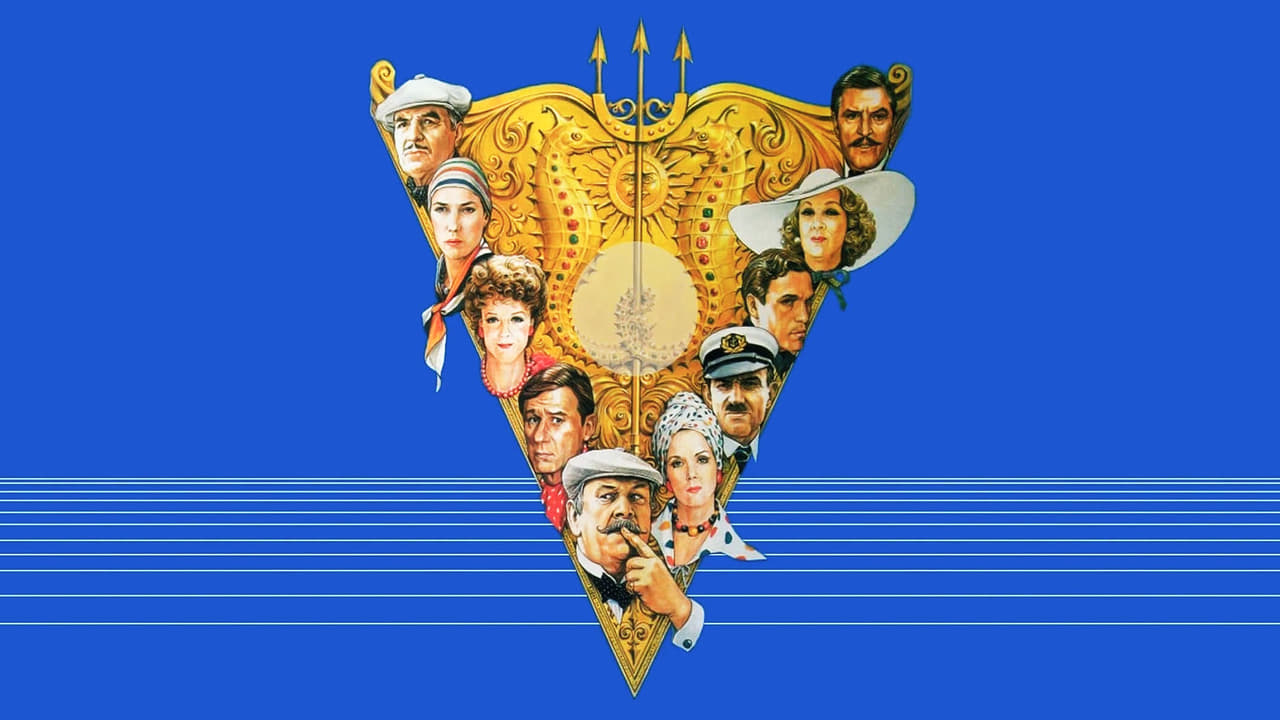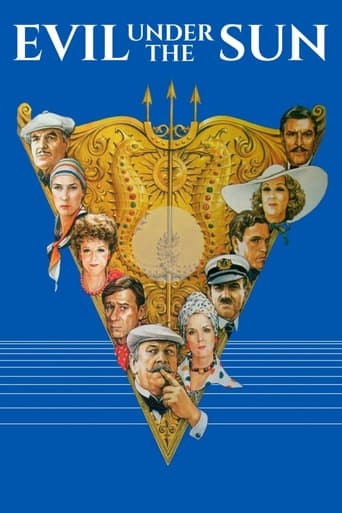

If the aim of the script was to turn Agatha Christie's "Poirot" potboiler into an elegant comedy of manners (and that is a fair assumption) and almost as it were to spoof the very stuff of which her mysteries are made, Shaffer has only partly succeeded in that laudable aim. He is let down partly by his cast, partly by his director but mostly by himself. The dialogue except for one or two instances (notably Mason's delightful speech about not having an alibi) is just not sufficiently witty (though Maggie Smith has a game try at making her lines ring with the requisite offhanded venom) and even descends at the climax into the standard detective novel ploy of an extremely long, extraordinarily tedious explanatory speech (lightened though it is by flashbacks to incidents we have not previously been shown! — talk about cheating!). Blakely's bombast is also a distinct handicap and Saran Miles is far too strident. Fortunately their roles are comparatively small. Mr. Clay is a bit too insipid to inspire confidence and Ustinov's accent is as faulty as an amateur stage Frenchman's; but Jane Birkin, the ever-reliable Roddy McDowall and James Mason, Diana Rigg and Emily Hone are well worth supporting. Sets and costumes are inspired. Locations, color photography look all that escapist hearts could desire. And there's a Cole Porter score including a delightful rendition of "You're the Top" by Diana Rigg. (Available on a very good quality, but rather sparse on extras, Optimum DVD).
... View MoreAfter the success of "Murder on the Orient Express" (1974) the producers decided to exploit the same formula for more Dame Agatha Christie on the silver screen: an exotic (or at least enclosed) location--the train in "Orient Express" or the ship in "Death on the Nile"; a cast of notable actors/stars and a clever, witty script.Paul Dehn turned in a sparkling script for "Murder on the Orient Express" that in subtle ways improved on the book while remaining remarkably faithful to it. When Dehn died at 63 before "Death on the Nile" he was replaced by Anthony Shaffer for "Death on the Nile." Anthony Shaffer ("Sleuth") was the younger brother of Peter ("Amadeus") and while his script is witty and charming (eliminating a lot of unpleasant characters and events to keep the story frothy) it tends toward the humor is often low (at one point a character is told "Go play with yourself." Shaffer's script also moves the action from a place off the coast of England to sunnier climes. And, in a wonderfully welcome change, he changes a tawdry heroine-smuggling subplot digression into a stolen-diamond caper more germane to the story.While Paul Dehn's improvements to "Orient Express" were for tightening and sparkle (he gave M. Bouc's character a line at the end Christie was a fool not to have thought of!), Shaffer's changes radically alter the book. They include a sex change, turning one character from a female to a flamboyant male character for Roddy McDowell. While Shaffer's story isn't bad and makes a fun movie, it's not Christie."Evil Under the Sun" is the third in the series kicked off by "Murder on the Orient Express" (1974) of glamorous, all-star Christies. But whereas "Orient Express" boasted luminaries like Sean Connery, Lauren Bacall, Ingrid Bergman, Michael York, Jacqueline Bisset and John Gielgud; and "Death on the Nile" was nearly as jam-packed with star names; "Evil Under the Sun" boasts an aging James Mason, the underrated Roddy McDowell, a radiant Diana Rigg, and a the then-rising talent Nicholas Clay.By this time, too, this Christie series was slowly turning into a stock company. This was the second outing for Maggie Smith and Jane Birkin from "Death on the Nile"); and for Denis Quilley and Colin Blakeley (from "Murder on the Orient Express").The biggest problem with "Evil" is Peter Ustinov. This was his second Poirot (Albert Finney was Poirot in "Murder on the Orient Express"), and he would go on to portray the Belgian detective an unbelievable four more times (all on television).Shaffer's story and character changes are damaging to Christie purists, but Ustinov bears no resemblance to Poirot. The best we can say is, he's a different detective with the same name.Giving Ustinov's clever but visually dissatisfying Poirot and the radical revamping of both the story and the character, "Evil Under the Sun" put an end to the hitherto promising Brabourne/Goodwin productions of Agatha Christie. And rightfully so. Fun as it can be, the movie detours from their original intention, from "Murder on the Orient Express" to do Christie "right." However good Shaffer's story is, its deviations from Christie are not insignificant.The diminishing of star talent in this series, and its gradually turning the movies in to a repertory company with fully half the actors returning from earlier movies--whether due to budgetary concerns or whatever--makes this the last, and least, of a once-promising line. Enjoy "Evil Under the Sun" for what it is, but don't rush out and read the book thinking it's the same. It ain't.
... View MoreI absolutely worship Agatha Christie and am addicted to reading, watching and listening to everything she ever did. This year alone, I think I read at least twelve of her novels and (re-)watched a handful of movies that are based on her legendary writings. This woman truly was a genius and there are few creative minds that I respect and admire more! It's only been a few months since I watch "Death on the Nile" for the fourth time, but for some inexplicable reason this was just the first time that I laid my hands on "Evil under the Sun". From many viewpoints, this film is extremely similar to the aforementioned "Death on the Nile" (1978) and, to a lesser extent, "Murder on the Orient Express" (1974). All films feature a sizeable cast of characters, of which each and every single one is eccentric and on the verge of loathsome, and - in good old Agatha Christie tradition - they also all have the profile as well as the motives to be a potential and secretive murderer. All three films also take place in a confined and inescapable location (a train, a cruise ship or in this case a remote tropical island) and it takes a relatively long time before the pivot murder is being committed, allowing more than enough time to elaborate on all the suspects' motives and their feelings of hatred towards the murder victim. In this tale, which was moved from the English coast towards a high- society island resort in the Adriatic Sea, the brilliant detective Hercule Poirot investigates the whereabouts of a valuable diamond. The beautiful and famous actress Arlena Marshall is also on the island to spend her honeymoon with her new but much older new husband Kenneth and step-daughter Linda. Poirot quickly notices that literally everyone on the island bears a deep grudge against Arlena, whether it's because of historical feuds, her adulterous nature or her stubborn business decisions. When Arlena's body is eventually found, strangled on the beach, all suspects quickly provide Poirot with waterproof alibis. I'm not entirely sure if Mrs. Christie would have appreciated the fact that her story was transferred to a more tropical location, since she was so typically British with regards to her locations and character drawings, but at least director Guy Hamilton splendidly makes use of the holiday resort setting and masterfully directs the extended A-listed cast. Peter Ustinov literally merges with his Poirot character and many of the great names in the supportive cast clearly had an excellent time appearing in this grotesque whodunit. The 1945 film "And Then There Were None" inarguably remains the greatest Agatha Christie adaptation, and personally I was more blown away by "Murder on the Orient Express" as well, but "Evil under the Sun" nevertheless comes highly recommended in case you're looking for something to watch on a lazy, rainy Sunday afternoon.
... View More1982 Agatha Christie is just that. What makes this film so engaging is that everyone has an alibi in the murder of Diana Rigg, a woman you just love to hate for her apparent abusiveness and disdain for others.The film is made even better by Cole Porter's songs which are so appropriately used in the various situations. Examples of this would be I Concentrate on You, as Inspector Poirot zooms in on all the likely suspects.Sylvia Miles, a grand dame in the film is married to James Mason. With her flashy outfits and memorable Brooklyn-Bronx accent, she shows us a memorable character. Ditto for Maggie Smith with her swaggering walk from Jean Brodie.You're wondering to the last minute how Hercule will get the proof he needs on our suspecting villains. The wait is worth it.
... View More